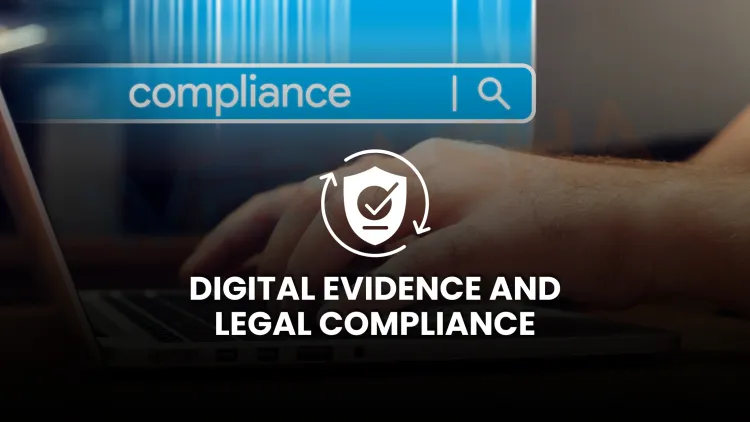What are the legal aspects of digital forensics and how do they affect evidence admissibility in court?
The legal aspects of digital forensics refer to the laws, policies, and regulations governing the collection, preservation, and presentation of digital evidence. Key areas include maintaining the chain of custody, respecting privacy laws like GDPR and CCPA, ensuring lawful search and seizure, and using court-admissible tools. A failure to follow these can result in evidence being dismissed or legal penalties. Cybersecurity and forensic professionals must align their technical investigation procedures with legal frameworks to ensure ethical and admissible outcomes in court.

Table of Contents
- What Is Digital Forensics?
- Why Are Legal Aspects Crucial in Digital Forensics?
- Major Legal Principles in Digital Forensics
- International and Local Compliance Standards
- Common Legal Pitfalls in Digital Forensics
- Privacy and Ethics in Digital Forensics
- Real-World Case Example
- Tools That Support Legal Compliance in Forensics
- Digital Forensics in the Cloud Era
- Role of Digital Forensics Experts in Court
- Best Practices for Legal Forensic Investigations
- The Future of Legal Digital Forensics
- Summary Table: Key Legal Considerations in Digital Forensics
- Conclusion
- Frequently Asked Questions (FAQs)
As digital crime grows, so does the demand for lawful investigations. Digital forensics plays a crucial role in uncovering cybercrimes, but if mishandled, evidence can become legally invalid. Understanding the legal aspects of digital forensics ensures that evidence is collected, preserved, and presented in a way that stands up in court. In this blog, we’ll explore how laws, privacy, and due process apply to digital investigations—backed with real-world examples.
What Is Digital Forensics?
Digital forensics is the process of identifying, preserving, analyzing, and presenting digital evidence from devices like computers, phones, servers, and networks. It supports investigations related to cybercrimes, intellectual property theft, insider threats, and even physical crimes.
Why Are Legal Aspects Crucial in Digital Forensics?
Without legal compliance, digital evidence can be deemed inadmissible in court. Legal aspects ensure:
-
The chain of custody is maintained
-
Privacy rights are respected
-
Search and seizure laws are followed
-
Investigations comply with national and international regulations
Major Legal Principles in Digital Forensics
1. Chain of Custody
It refers to a documented timeline of who collected, accessed, and handled the evidence. Any gap can make the evidence unreliable in court.
Example: In a fraud case, if an analyst downloads logs without recording the source and method, the data can be rejected as untrustworthy.
2. Search and Seizure Laws
Authorities must have a warrant or legal authorization before accessing digital devices. Otherwise, it's a violation of the Fourth Amendment (in the U.S.) or equivalent laws elsewhere.
3. Admissibility of Evidence
Courts only accept evidence that is:
-
Legally obtained
-
Authentic
-
Relevant to the case
-
Not tampered with
International and Local Compliance Standards
✅ GDPR (EU)
Investigators must ensure that data privacy rights are not violated. Personal data collection must have legal grounds.
✅ Indian IT Act, 2000
The Information Technology Act governs digital crimes and the admissibility of digital evidence in Indian courts.
✅ U.S. Federal Rules of Evidence
These define when and how electronic evidence is acceptable, including metadata and email traces.
Common Legal Pitfalls in Digital Forensics
| Mistake | Legal Consequence |
|---|---|
| Accessing devices without a warrant | Evidence gets dismissed |
| Breaking encryption without consent | Violation of privacy laws |
| Ignoring data retention policies | Regulatory penalties |
| Not documenting every step | Breach in chain of custody |
Privacy and Ethics in Digital Forensics
Investigators must balance cybercrime investigations with ethical boundaries, especially when dealing with personal data, minors, or sensitive content.
-
Always get consent (or legal backing) before accessing private messages
-
Avoid over-collection of irrelevant data
-
Protect the confidentiality of all users, not just the accused
Real-World Case Example
Case: U.S. v. Warshak (2010)
The court ruled that accessing private emails without a warrant violated the Fourth Amendment. This case set a precedent for requiring warrants to access cloud-stored emails.
Tools That Support Legal Compliance in Forensics
-
EnCase – Maintains chain of custody logs automatically
-
FTK (Forensic Toolkit) – Provides legally structured evidence reports
-
Magnet AXIOM – Redacts PII and filters out irrelevant data for legal clarity
Digital Forensics in the Cloud Era
Modern digital evidence often resides on cloud platforms like Google Drive, Microsoft 365, or AWS. Legal challenges include:
-
Jurisdiction issues (data stored across borders)
-
Shared responsibility models
-
Lack of clear authorization paths
Investigators must navigate cloud provider policies and international laws for proper evidence collection.
Role of Digital Forensics Experts in Court
Forensic analysts often serve as expert witnesses, where they must:
-
Explain technical evidence in simple terms
-
Defend their methods and tools
-
Demonstrate chain of custody integrity
-
Withstand cross-examination on the legality of procedures
Best Practices for Legal Forensic Investigations
-
Get written authorization before device access
-
Use court-approved tools with audit trails
-
Follow standard operating procedures (SOPs)
-
Collaborate with legal teams from Day 1
-
Regularly train on legal updates and compliance frameworks
The Future of Legal Digital Forensics
As laws evolve to match AI-generated content, encrypted messaging apps, and IoT device data, forensic professionals must:
-
Stay updated on new privacy laws (like DPDPA in India)
-
Adopt blockchain-backed chain-of-custody systems
-
Develop forensic readiness policies within organizations
Summary Table: Key Legal Considerations in Digital Forensics
| Aspect | Description | Relevance |
|---|---|---|
| Chain of Custody | Timeline of evidence handling | Ensures admissibility |
| Authorization | Legal consent or warrant | Prevents illegal search claims |
| Privacy Laws | GDPR, CCPA, etc. | Prevents rights violations |
| Tool Legitimacy | Court-approved software | Increases credibility |
| Documentation | Step-by-step logs | Required for defense or cross-examination |
✅ Conclusion
Legal aspects of digital forensics are non-negotiable in any investigation. Whether dealing with cyber fraud, insider threats, or ransomware, aligning technical methods with legal frameworks ensures that your findings are court-admissible, ethically sound, and defensible under scrutiny.
Digital forensics isn't just about cracking devices—it's about proving the truth within the bounds of the law.
FAQs
What are the legal aspects of digital forensics?
Legal aspects refer to laws and policies governing the collection, preservation, and use of digital evidence in a legally compliant manner.
Why is chain of custody important in digital forensics?
It ensures the integrity and traceability of digital evidence, making it admissible in court.
Can digital evidence be used in court without a warrant?
Usually no. Without a warrant or legal authorization, the evidence may be excluded due to unlawful search.
What laws affect digital forensic investigations?
Laws such as GDPR, CCPA, Indian IT Act, and U.S. Fourth Amendment influence how evidence can be collected and used.
What is GDPR's impact on digital forensics?
GDPR mandates protection of personal data, requiring legal grounds before collecting or analyzing digital evidence.
What does “admissible evidence” mean in court?
It refers to evidence that meets legal standards and can be lawfully presented during a trial.
What happens if the chain of custody is broken?
The evidence may be ruled inadmissible because its authenticity or integrity cannot be confirmed.
Is email evidence legal in court?
Yes, if collected lawfully and properly documented as part of the forensic process.
Can encrypted data be analyzed legally?
Only with appropriate consent or legal authority like a warrant, or if decryption complies with local laws.
What is a digital forensic warrant?
It’s a legal order allowing authorized personnel to access and analyze digital devices or accounts.
How does the Indian IT Act affect digital evidence?
It legalizes electronic records and governs procedures for collecting and presenting digital evidence in Indian courts.
Can cloud data be legally accessed in a forensic case?
Yes, but jurisdictional challenges and provider policies must be respected with proper legal channels.
What are forensic readiness policies?
These are internal company policies to prepare systems and teams for legal and compliant forensic investigations.
Are screenshots considered legal digital evidence?
They can be, but their authenticity must be provable and accompanied by proper documentation.
What is meant by forensic tool compliance?
It refers to using software that maintains logs, preserves evidence integrity, and is accepted by legal courts.
Do digital forensics experts testify in court?
Yes, they often serve as expert witnesses to explain findings and verify legal compliance.
What is the role of metadata in legal forensics?
Metadata helps verify file creation, modification, and user activity, making it valuable in legal investigations.
What is the CCPA’s role in digital forensics?
It restricts access to consumer data, requiring lawful consent before any digital investigation involving personal data.
Can deleted files be used as legal evidence?
Yes, if recovered lawfully and processed while maintaining chain of custody.
How do courts verify digital evidence?
Courts assess authenticity, legal collection methods, and chain of custody documentation.
Can forensic analysts access social media legally?
Only with user consent, public access, or through proper legal procedures like subpoenas.
How do privacy laws impact forensic procedures?
They set boundaries on what can be collected and ensure individuals' rights are not violated.
Are mobile phones covered under digital forensics laws?
Yes, mobile data is protected under laws like GDPR and requires lawful access for analysis.
What is the role of expert witness reports in court?
They summarize technical findings in legally acceptable language for judges and juries.
Is employee surveillance evidence legally valid?
Only if the organization follows proper legal procedures and informs employees as per policy.
Can forensics be done without alerting the suspect?
Yes, but it must still follow all legal procedures and warrants to be court-admissible.
What if data is stored outside the country?
Cross-border data laws and international treaties must be followed to avoid legal violations.
How is data privacy protected in corporate investigations?
By following privacy-by-design practices and accessing only what’s legally necessary.
What are legal risks of unauthorized forensic analysis?
It may lead to lawsuits, penalties, and dismissal of evidence in critical cases.
Why should companies train staff in forensic law?
To ensure investigations are legally sound and protect organizations from legal repercussions.














![Top 10 Ethical Hackers in the World [2025]](https://www.webasha.com/blog/uploads/images/202408/image_100x75_66c2f983c207b.webp)








